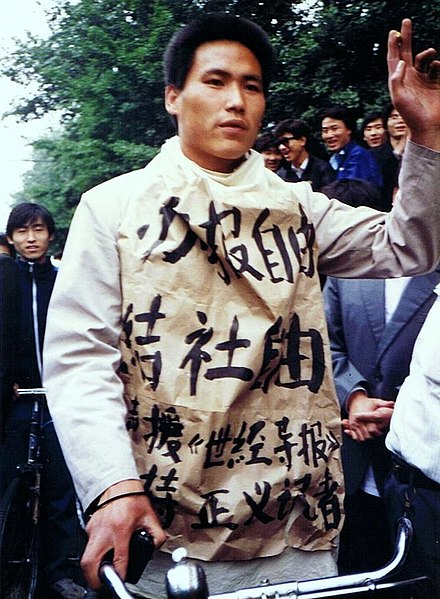Censorship in the People's Republic of China is mandated by the PRC's ruling party, the Chinese Communist Party (CCP). It is one of the strictest censorship regimes in the world. The government censors content for mainly political reasons, such as curtailing political opposition, and censoring events unfavorable to the CCP, such as the 1989 Tiananmen Square protests and massacre, pro-democracy movements in China, the persecution of Uyghurs in China, human rights in Tibet, Falun Gong, pro-democracy protests in Hong Kong, and aspects of the COVID-19 pandemic. Since Xi Jinping became the general secretary of the Chinese Communist Party in 2012, censorship has been "significantly stepped up".

A page about the 1989 Tiananmen Square Protests on The Economist ripped out by China's censorship departments. Publications like The Economist are not allowed to be printed within mainland China; thus, China's censors can rip out unwanted contents from every imported publication by hand while clearing customs.
After Google announced its withdrawal from China, some people came to Google China's headquarters in Zhongguancun for an "illegal flower tribute".
1989 Tiananmen Square protests and massacre
The Tiananmen Square protests, known in China as the June Fourth Incident, were student-led demonstrations held in Tiananmen Square, Beijing, China, lasting from 15 April to 4 June 1989. After weeks of unsuccessful attempts between the demonstrators and the Chinese government to find a peaceful resolution, the Chinese government declared martial law on the night of 3 June and deployed troops to occupy the square in what is referred to as the Tiananmen Square massacre. The events are sometimes called the '89 Democracy Movement, the Tiananmen Square Incident, or the Tiananmen uprising.
1989 Tiananmen Square protests and massacre
Deng Xiaoping was the paramount leader of China.
Han Dongfang, founder of the Beijing Workers' Autonomous Federation
A photo of Pu Zhiqiang, a student protester at Tiananmen, taken on 10 May 1989. The Chinese words written on the paper say: "We want the freedom of newspapers, freedom of associations, also to support the 'World Economic Herald', and support those just journalists."






